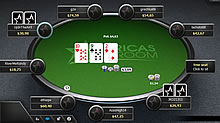
If you're a fan of Poker, the chances are, you play the variation Texas Hold'em - the most popular and well-known version of the game. But if you're digitally-savvy and much prefer playing Poker online at Paddy Power, you'll find numerous variations of the game - and they are all different in some way. For example, if you're used to playing limit games, as soon as you start playing no-limit variations, you'll notice that keeping your bankroll is a lot harder. So, whether you're new to limit games, or just the variation Omaha, here are our top tips which will keep you in the black, and ahead of other beginners the next time you play.
1. Select your table carefully: you'll want to play at a table where you have an edge - maybe some of your fellow players are weaker, you'll want to pick them off as quickly as possible to stand the best chance of winning. This leads nicely to the next point...
2. Assess your opposition: obviously playing online, it's harder to read players because you're not physically sat with them, but keep an eye on the players who play inferior hands, call big bets when they have weak hands, or those that fold when play gets aggressive. Even though you're playing online, you can still read your opponents to a degree.
3. Be selective with your starting hands: unlike in Hold'em where players are given two 'hole' (face-down) cards, in Omaha, each player receives four. Additionally, players must use two of these four cards when creating their best five-card hand. Ultimately, this means the starting round of the game is crucial and it's important you choose the correct hand in correlation with the situation.
4. Make the right decisions: in Poker, there's a phrase that goes "pump it or dump it". It basically does what it says - either pump money into the pot by betting or raising, or dump your cards and fold. Obviously assess the situation and make your move. Calling isn't recommended, unless you have a valid reason to. Go hard or go home.
5. Respect bold moves: unlike other variations of Poker, bluffing rarely happens in Omaha, and while you won't be able to tell online if players are bluffing, if your opponent bets big, or raises massively, respect them. The chances are they have got a very good hand and are trying to assert themselves by going slightly over the top.
6. Don't overplay unsuited aces: don't think like a Hold'em player, where a pair of Aces isn't too bad. While in Pot-Limit Omaha, a pair of Aces could form a strong hand pre-flop, as soon as the flop is revealed, if your hand doesn't improve, it's unlikely you'll win the pot, especially if multiple players are still involved and have better cards than you. By a similar token, don't overvalue pairs or two pairs, and stop playing like you would in Hold'em.
7. Don't play too many hands: this tip can be applied to all forms of Poker, and not just Omaha, but it's an important one to remember. Like we said before, know when to play and when to fold, be patient and make the right decisions. You'll quickly realise that bad hands outweigh good hands in Omaha and remember, you have four cards in your hand to choose from!




